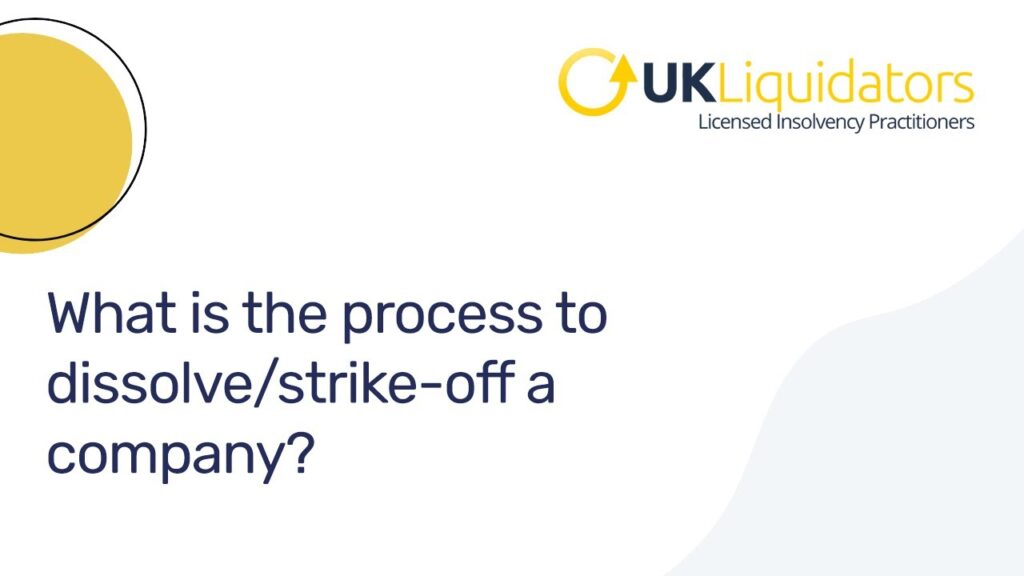A Comprehensive Overview to the Compulsory Strike Off Treatment in Corporate Governance
Navigating the elaborate landscape of corporate administration calls for an eager understanding of the procedures that regulate the dissolution of entities. The mandatory strike off procedure, an essential aspect in company administration, acts as a system to implement compliance and keep the integrity of the company environment. As businesses advance and scenarios modification, the need to strike off a company might develop for different factors. Checking out the ins and outs of this procedure, consisting of the legal implications, step-by-step steps, and post-strike off factors to consider, supplies important insights for stakeholders looking for to navigate the intricacies of business governance.

Factors for Compulsory Strike Off
There are a number of crucial reasons that might trigger the initiation of a mandatory strike off procedure for a company. Non-compliance with governing needs can elevate worries regarding the firm's operations and economic wellness, leading to the choice to strike off the company from the register.
In addition, business that have ceased trading or are no more carrying out any kind of organization tasks might additionally encounter obligatory strike off. This might be due to insolvency, mergings, or just a choice to wind up the firm. In such situations, maintaining the company on the register would certainly offer no function and might possibly create complication amongst stakeholders.
Ultimately, the requirement of a required strike off in business governance occurs when a company is no much longer operating according to the regulation or has ended up being obsolete, necessitating its removal from the authorities records.
Legal Effects and Risks
Offered the conditions that prompt an obligatory strike off in company administration, it is imperative to comprehend the legal implications and risks linked with such actions. When a firm is struck off the official register, it discontinues to exist as a legal entity.
Furthermore, there are legal repercussions for individuals entailed in the monitoring of a business that has actually been by force struck off. They might be disqualified from serving as supervisors in the future, face fines, or even jail time if transgression or fraudulent activities are uncovered. Furthermore, the reputational damage from an obligatory strike off can have enduring impacts on people and their ability to involve in future organization endeavors. Comprehending these legal effects and dangers is important for all stakeholders involved in the company administration procedure to navigate potential mistakes and ensure compliance with the law.
Actions in the Strike Off Refine
Launching the obligatory strike off procedure in corporate governance includes a series of prescribed actions outlined by governing authorities. The initial step usually requires the business to send an official application or notification to the pertinent federal government firm or registrar signaling its intent to be struck off the main register. Subsequently, the firm is often called for to settle any type of outstanding liabilities, debts, or tax obligations to make sure conformity with governing needs.
As soon as the preliminary documentation is sent and monetary commitments are fulfilled, the governing body will certainly publish a notification in the main gazette or a similar magazine to inform stakeholders concerning the impending strike off - compulsory strike off. This notification acts as a final possibility for any type of interested events to elevate objections or existing legitimate reasons why the business must not be dissolved
Adhering to the magazine of the notification, the regulative authority will wage the strike off procedure if no considerable arguments or barriers arise. The company will certainly then be formally liquified, and its name will certainly be gotten rid of from the register, efficiently noting the verdict of the compulsory strike off procedure in company governance.
Files Required for Strike Off
In compliance with regulatory standards, particular paperwork should be provided to promote the strike off process in company governance. In addition, economic statements, such as the business's most current equilibrium sheet, have to be consisted of to make sure that all monetary obligations have been cleared up prior to initiating the strike off treatment. It is essential to make sure that all the requisite documentation is meticulously prepared and submitted in conformity with the suggested guidelines to quicken the strike off procedure properly.
Post-Strike Off Responsibilities and Factors To Consider
Following the completion of the essential paperwork for strike off, interest shifts to the post-strike off responsibilities and considerations that are vital in the business administration process. When a company has actually been struck off the register, it is vital to first gazette notice make certain that all remaining properties are handled properly. This includes dispersing any kind of staying funds among shareholders and working out any arrearages or responsibilities. Additionally, company supervisors have to make certain that all tax obligation responsibilities are satisfied, final employee settlements are made, and that all needed filings are completed with relevant governing bodies.

Final Thought
Finally, the compulsory strike off treatment in company governance acts as a required mechanism to get rid of obsolete business from the register. Understanding the factors, legal implications, actions, and records required for strike off is important for compliance with governing demands. It is necessary for companies to accomplish their post-strike off responsibilities and consider the effects of this procedure in order to maintain excellent standing and stay clear of possible dangers.
There are numerous crucial reasons that might motivate the initiation of a required strike off treatment for a firm (first gazette notice for compulsory strike-off). Non-compliance with governing demands can elevate worries about the business's operations and financial health and wellness, leading to the decision to strike off the business from the register
